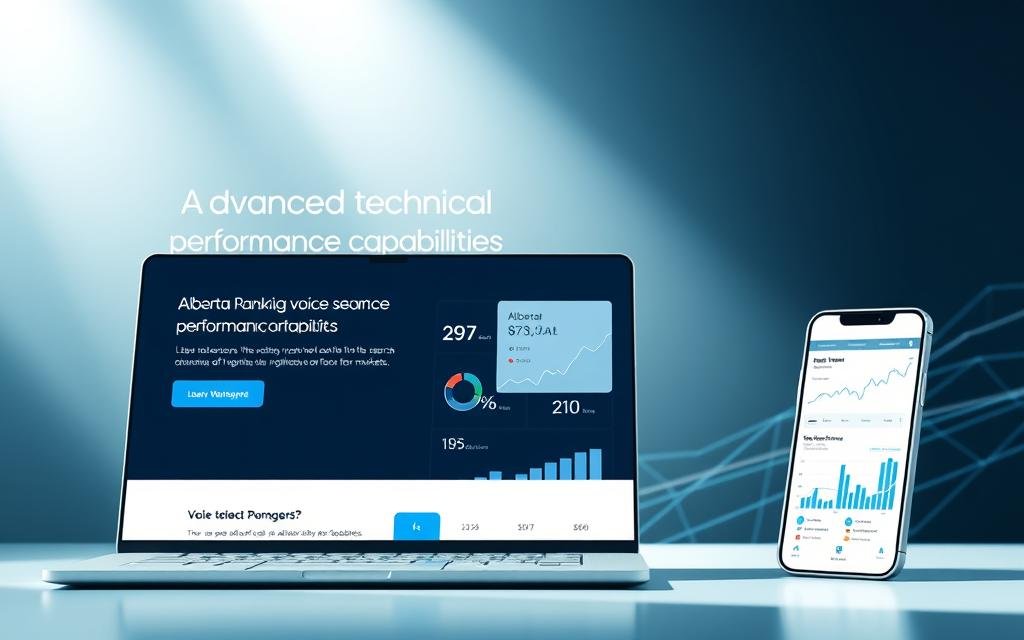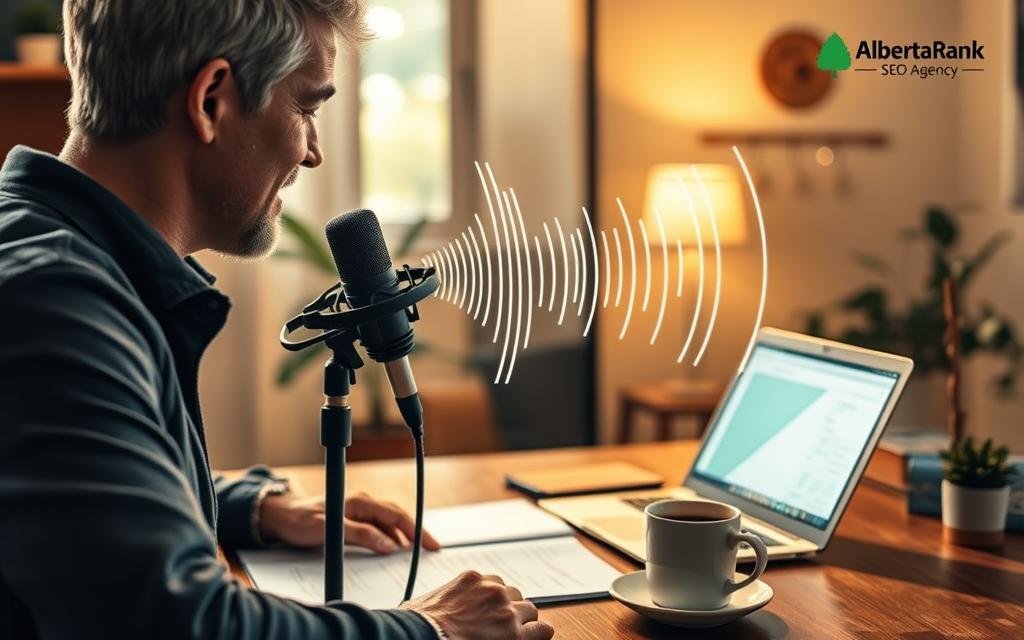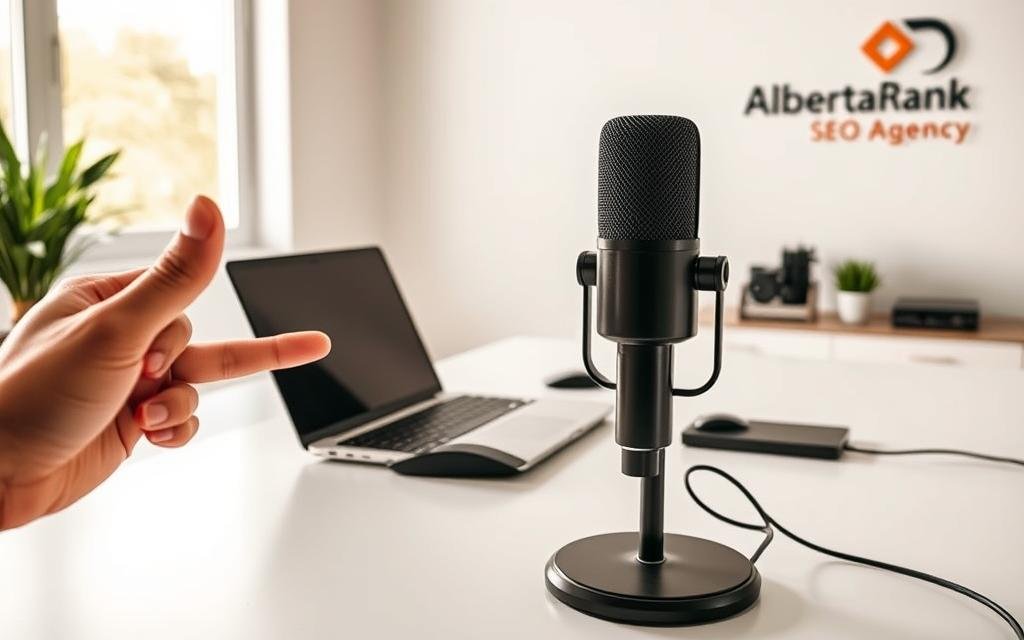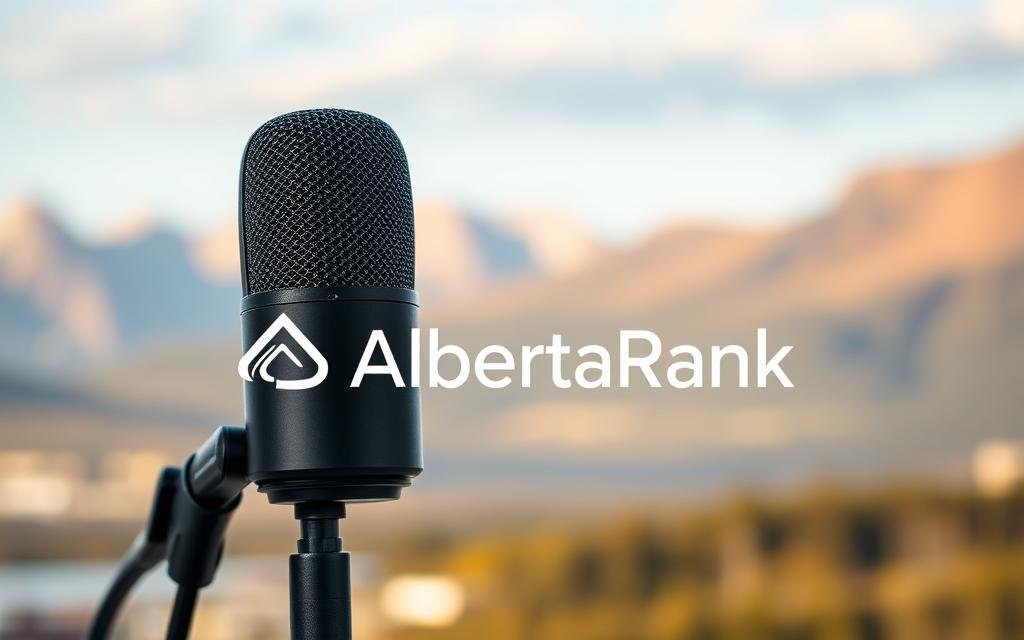Curious how a simple question from a customer’s phone could steer more locals to your door? We’ve seen a fast shift in how people find services in Calgary and Edmonton. Daily use of smart assistants means conversational queries now shape who shows up first.
At AlbertaRank, we map that new behaviour into practical steps for your business. Our approach blends local intent, quick answers, and structured information so your website is ready when someone asks for nearby help.
This guide will explain the difference between typed and spoken queries, and show why concise, natural phrasing and technical speed matter. We focus on clear metrics — calls, direction requests and conversions — so you see real results without agency fluff.
Key Takeaways
- Local intent wins: conversational queries often seek nearby services.
- Concise answers and structured content improve pick-up by assistants.
- Technical speed and schema boost position‑zero opportunities.
- We measure outcomes with clear KPIs tied to calls and visits.
- AlbertaRank offers practical, local plans for Calgary and Edmonton businesses.
Understanding Today’s Voice Search Landscape in Alberta
Across Calgary and Edmonton, people increasingly ask devices for quick directions and nearby services. That change matters for every local business that wants visitors through the door.
What we see: about 28% of consumers use assistants daily. Many queries are local — hours, directions, and “best near me” type questions that lead directly to visits.
Different assistants use different sources. Siri leans on Google results; Alexa pulls from Bing and Yelp for some local listings. That means your website and profiles must be accurate across multiple platforms.
| Assistant | Main Data Sources | Best Local Strength |
|---|---|---|
| Google Assistant | Google Maps, Google My Business | Maps directions, local intent |
| Siri | Google results | Quick answers, device integration |
| Alexa | Bing, Yelp | Place details, reviews |
Queries tend to be longer and framed as questions. Assistants reward concise, authoritative answers and accurate hours. We track calls, direction requests and map impressions to measure real impact.
For help tailoring this to your industry, call us at 403 671 3278 during business hours.
Researching Conversational, Long‑Tail Keywords the Alberta Way
We start by listening to how Albertans actually ask for help, not how marketers think they do. That means collecting natural language phrases, question formats and neighbourhood modifiers that match real intent.
We build lists of question‑based terms using who, what, where, when and how. These match how users ask for hours, pricing and directions. Short, direct answers win.

Finding natural language and question keywords for assistants
We capture spoken queries like “Where can I get furnace repair in Calgary today?” then add variants and common mispronunciations. This improves matching and keeps content readable.
Mapping intent from “near me” to service queries
We segment discovery intent (near me) from service intent (how much, emergency, availability). Each page answers one clear question to boost direct results.
Prioritizing low‑difficulty, location‑aware long‑tails
To get quick wins, we target low‑difficulty long‑tail keywords tied to cities, neighbourhoods and landmarks. This moves calls and visits faster while we scale to tougher phrases.
- Hyper‑local modifiers: neighbourhoods, trails and rivers.
- Question lists: what, where, how, when formats.
- Quick wins: low difficulty, high intent terms.
Winning Featured Snippets and SERP Features for Voice Answers
Position‑zero responses turn casual queries into real visits for Alberta businesses. We build short, scannable answer blocks and FAQ sections to earn featured snippets and People Also Ask placements.
Why this matters: assistants often read a single, concise answer from a SERP feature. A 2019 study found about 70% of spoken replies came from such features, so capturing that spot lifts calls and visits.
Structuring concise answers for position zero and People Also Ask
We craft 40–50 word answer boxes for common Alberta questions. Each box names the business, location and hours when relevant.
- Short summary: one sentence, clear fact.
- Quick steps or list: formatted for extraction.
- FAQ blocks: mirror PAA phrasing to increase footprint.
Analysing cross‑engine SERPs used by Siri, Alexa, and Google Assistant
We check how different search engines and voice assistants pull sources. Siri leans on Google; Alexa favours Bing and Yelp. That means we test formatting and schema across engines.
“Featured snippets are pivotal because assistants read short answers; cross‑engine checking is essential.”
We monitor which snippets your pages win and refine headings, questions, and schema to keep those positions consistent as algorithms shift.
Local SEO Essentials for Voice Searches in Alberta
When your profiles and pages match how Albertans ask, more people call and walk in. We focus on clear, local data so assistants return accurate answers and directions.
Optimizing your Google Business Profile
We claim and refine your google business profile with exact NAP, categories, hours (including holidays) and service lists. This improves how often your business is selected for quick answers and map directions.
Consistent listings, reviews and directories
We standardize listings across Bing Places, Yelp and Apple Maps so non‑Google sources show the same facts. We also run a proactive reviews program to gather and showcase local feedback.
City, neighbourhood pages and landmark directions
We build Calgary, Edmonton and neighbourhood pages with embedded maps, FAQ snippets and landmark directions like “near Chinook Centre.” That matches how users ask and raises your chance of being chosen.
| Platform | Why it matters | Key action |
|---|---|---|
| Google Business | Primary source for many assistants | Claim, verify, update hours and attributes |
| Bing & Yelp | Secondary sources for some assistants | Sync NAP and categories |
| Apple Maps | Mobile device navigation | Add accurate address and landmarks |
We implement LocalBusiness schema, keep seasonal info current, and measure calls, direction requests and local impressions to show results.
Want a local audit? Call us at 403 671 3278 and we’ll review your business profile, pages and listings for better results.
Technical Performance that Voice Search Users Expect
Users expect instant answers; our work makes sure your pages deliver under real mobile conditions.
We deliver fast, secure, mobile‑ready websites that delight customers and align with voice expectations without inflated agency costs.

Speed, mobile responsiveness, and HTTPS for better outcomes
Load speed matters. Slow pages miss the moment when someone needs quick info. We prioritise Core Web Vitals and reduce redirects so your site answers fast.
Core fixes: image compression, caching, and clean code on mobile devices
We compress and size images correctly, implement caching and CDN, and minify CSS/JS. That cuts latency and keeps pages usable on neighbourhood networks.
- Responsive design: pages render cleanly on mobile devices so users can tap through from a spoken result.
- HTTPS everywhere: protects customers and supports ranking signals used by search engines.
- Code hygiene: defer non‑critical scripts and remove bloat so crawlers find key content fast.
| Issue | Fix | Benefit |
|---|---|---|
| Large images | Compress & serve WebP | Faster page loads on mobile devices |
| Render‑blocking scripts | Defer or async | Improved First Contentful Paint |
| Unreliable hosting | Upgrade to managed hosting & CDN | Better uptime and consistent results |
We test on real Alberta networks and report before‑and‑after metrics tied to calls, directions and conversions — not jargon.
Structured Data to Help Search Engines Speak Your Business
Structured markup tells platforms exactly who you are, where you operate, and what services you offer. We use schema to turn scattered site facts into clear, machine‑readable information that devices and engines can rely on.
Why it matters: assistants and other engines prefer pages that declare core facts. Proper schema raises your odds of rich results, spoken answers and higher click rates.
Implementing LocalBusiness and service schema for Alberta firms
We add LocalBusiness, Service, Product and FAQ schema to declare your name, address, phone and hours. This reduces mistakes when devices present information to customers.
- LocalBusiness + Service: declares location, offerings and category.
- FAQ & Review: surfaces common questions and trust signals for rich snippets.
- Opening hours: include holiday schedules so assistants read current hours.
Enhancing eligibility for rich results with clear hours and reviews
We mark up reviews and ratings to strengthen trust signals. That helps your site win featured placements and improves spoken recommendations.
“Well‑structured schema is underused but powerful — it makes your business easy to pick from a list.”
We validate markup with testing tools, monitor impressions and clicks from rich results, and keep schema updated as your business changes.
Crafting Voice‑Friendly Content that Sounds Natural
Short, direct lines help your site give the exact information locals need on the move.

Front‑load answers: put the main answer in the first 40–50 words so assistants and people get the fact fast.
Write like Albertans talk: use plain words, short sentences, and local place names like Calgary or Edmonton to match queries.
Short, direct answers and skimmable formatting for spoken results
Use headings, bullets and numbered steps so content is easy to scan. That helps devices and visitors find information without extra clicks.
- Start with a one‑line summary that names your business and location.
- Follow with quick facts: hours, phone, and how to get there.
- Create FAQs using exact questions customers ask to improve pick‑up for spoken answers.
Keep pages action-ready: place a clear call to action and contact near the top. We also vary wording for similar queries to capture related intent without duplicate pages.
“A living FAQ that reflects real customer questions keeps your website useful and current.”
Voice Search SEO Measurement and Iteration
We measure how local queries turn into real customers with clear, monthly reports. Our focus is simple: link short answers and page fixes to calls, direction requests and revenue.

Tracking rankings, SERP features, and location performance
We monitor keyword positions, local pack presence, featured snippets and People Also Ask wins to map your footprint in search results.
We segment by city and neighbourhood so Calgary and Edmonton pages show where to push harder. We also watch device trends so your website meets on‑the‑go expectations.
Refining content from real voice search queries and user behaviour
We collect actual search queries from profiles, analytics and customer chats. Those questions become new FAQs or page edits.
- Measure calls, directions and web actions tied to each result.
- Test snippets, headings and answer formats to increase read‑aloud chances.
- Run ongoing technical checks for performance and indexation.
“We prove ROI with plain reports that show what moved, why it moved, and our next steps.”
We iterate monthly, benchmark against Alberta competitors, and align updates with your promotions so results keep growing.
Conclusion
We wrap this guide with a clear, local action plan to move more Albertans from question to customer.
Start by tightening your business profile and directory listings like the google business profile, Yelp and Bing Places. Then target long-tail keywords and craft concise content that fits assistant‑style answers.
Improve technical speed for mobile devices and format pages to earn featured snippets. Track the metrics that matter — calls, direction requests and conversions — so you see real results.
We offer practical services, fair pricing and clear reporting for Calgary and Edmonton businesses. Call us at 403 671 3278 (Mon–Fri 9am–5pm) or connect on our social channels to get a quick assessment and a right‑sized plan.
FAQ
What is voice search SEO and why does it matter for Alberta businesses?
Voice search SEO is the practice of optimising your website and Google Business Profile so virtual assistants return your business as the spoken answer. For Calgary and Edmonton companies, it helps capture mobile and in-car queries, boosts local visibility, and drives more calls and visits. We focus on natural language, local intent and featured snippets to improve results on Google Assistant, Siri and Alexa.
How do we find conversational, long‑tail keywords for Alberta customers?
Start by listening to how locals ask questions — “plumbers near me Calgary” or “late-night pizza Edmonton.” Use long‑tail phrases, question formats and tools that show query data from mobile devices and voice assistants. Map intent from informational to transactional and prioritise low-difficulty, location-aware keywords for quick wins on your site and Google Business Profile.
How should answers be structured to win featured snippets and spoken results?
Keep answers short, direct and scannable — one clear sentence plus a concise paragraph and a simple list if needed. Use headings that match user questions, add FAQ markup and schema so search engines can pull your text into position zero and People Also Ask results used by voice assistants.
What local SEO elements influence voice search performance?
Consistent NAP (name, address, phone), up-to-date Google Business Profile, quality reviews, local citations and city or neighbourhood pages matter most. Mention landmarks and directions, and ensure your business category and services are clear to improve relevance for “near me” queries across search engines.
Which technical fixes improve outcomes for users asking by voice?
Prioritise mobile speed, HTTPS, image compression, caching and clean code. Voice users expect fast, reliable answers on phones and in cars, so improving Core Web Vitals and mobile responsiveness increases the chance your pages will be chosen as spoken results.
How does structured data help my business be selected by voice assistants?
Implement LocalBusiness and service schema, publish clear hours, contact info and aggregate reviews. Rich results make it easier for Google Assistant and others to parse and speak your content, raising the likelihood of being returned for local queries.
What content style performs best for spoken answers?
Short, direct sentences written in natural language work best. Use question-and-answer blocks, bulleted lists and conversational phrasing that matches how people ask queries. Avoid jargon and keep copy local — mention Calgary, Edmonton or nearby neighbourhoods when relevant.
How should we measure and iterate on voice search performance?
Track rankings, presence in SERP features, click-throughs, calls and direction requests from Google Business Profile. Analyse real voice search queries from analytics and refine content, schema and landing pages based on user behaviour and device data to improve conversions.
Can small Alberta businesses see quick wins with this approach?
Yes. By prioritising low-difficulty, location-specific long‑tail phrases, cleaning up your Google Business Profile and adding concise FAQ answers with schema, small businesses can capture more spoken queries and drive immediate traffic and leads.
Do we need to optimise differently for Google Assistant, Siri and Alexa?
The fundamentals are the same — clear answers, fast pages and local signals — but cross‑engine analysis helps. Google favours featured snippets and Business Profile data, Siri uses Apple Maps and web results, and Alexa leans on skills and trusted sources. We test across platforms and tune content accordingly.


